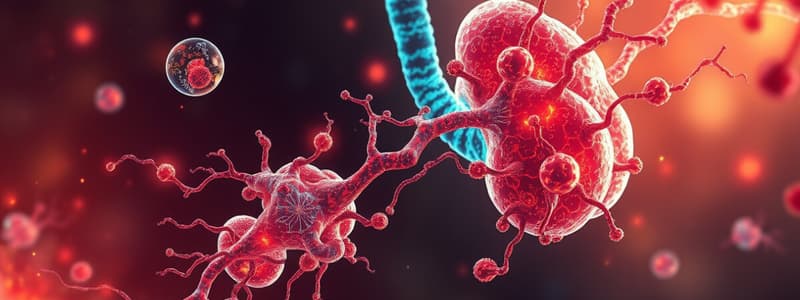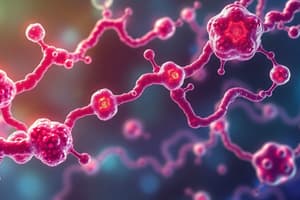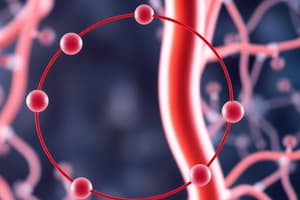Podcast
Questions and Answers
What are the possible fates of pyruvate? (Select all that apply)
What are the possible fates of pyruvate? (Select all that apply)
- Conversion to lactate by lactate dehydrogenase (correct)
- Conversion to ethanol by fermentation
- Conversion to oxaloacetate by pyruvate carboxylase (correct)
- Conversion to acetyl CoA by PDH (correct)
What is produced when pyruvate is converted under anaerobic conditions in yeast cells?
What is produced when pyruvate is converted under anaerobic conditions in yeast cells?
Ethyl alcohol
What do muscle cells produce under anaerobic conditions?
What do muscle cells produce under anaerobic conditions?
Lactate
What is the purpose of lactic acid fermentation?
What is the purpose of lactic acid fermentation?
Pyruvate decarboxylase and alcohol dehydrogenase are involved in alcoholic fermentation.
Pyruvate decarboxylase and alcohol dehydrogenase are involved in alcoholic fermentation.
What is lactic acid fermentation?
What is lactic acid fermentation?
What does lactate dehydrogenase catalyze?
What does lactate dehydrogenase catalyze?
Under aerobic conditions, what does pyruvate convert to?
Under aerobic conditions, what does pyruvate convert to?
What inhibits pyruvate dehydrogenase (PDH)?
What inhibits pyruvate dehydrogenase (PDH)?
What do aerobic organisms convert pyruvate into in the presence of oxygen?
What do aerobic organisms convert pyruvate into in the presence of oxygen?
Flashcards are hidden until you start studying
Study Notes
Fates of Pyruvate
- Pyruvate can be converted into acetyl CoA through the action of pyruvate dehydrogenase (PDH).
- Under anaerobic conditions, pyruvate can be turned into lactate via lactate dehydrogenase.
- Pyruvate can also be transformed into oxaloacetate by the enzyme pyruvate carboxylase, particularly when there is an accumulation of acetyl CoA, which inhibits PDH.
Fermentation Process
- In plants and yeast, pyruvate is converted to ethanol through a fermentation process.
- This fermentation involves two key enzymes: pyruvate decarboxylase and alcohol dehydrogenase.
Purpose of Alcoholic Fermentation
- The main goal of alcoholic fermentation is to regenerate NAD+, which is necessary for the continuation of glycolysis.
Anaerobic Production
- Yeast and some bacteria produce ethyl alcohol under anaerobic conditions.
- In contrast, muscle cells under anaerobic conditions form lactate or lactic acid.
Lactic Acid Fermentation
- Lactic acid fermentation serves to recycle NAD+ for glycolysis, ensuring its continuity when oxygen is scarce.
- It is a form of anaerobic cellular respiration that generates lactic acid from sugars.
Lactate Dehydrogenase
- Lactate dehydrogenase is the enzyme responsible for converting pyruvate to lactate, using NADH and H+ in the process:
- Reaction: pyruvate + NADH + H+ → lactate + NAD+.
Aerobic Conditions
- In the presence of oxygen, pyruvate produced during glycolysis is converted to acetyl CoA, leading to further metabolic pathways.
- Pyruvate dehydrogenase is the enzyme that catalyzes the transformation of pyruvate into acetyl CoA; its activity is influenced by insulin and inhibited by high levels of acetyl CoA.
End Products of Aerobic Metabolism
- The complete oxidation of pyruvate in aerobic organisms results in the production of carbon dioxide (CO2) and water (H2O).
Studying That Suits You
Use AI to generate personalized quizzes and flashcards to suit your learning preferences.




